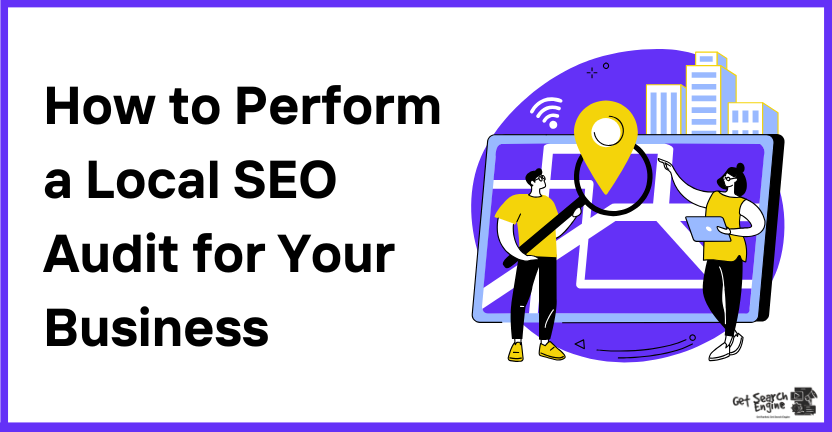Most people don’t “wander in” anymore. They discover you through Google, Maps, and near me searches long before they see your storefront or call your number. If you’re invisible there, you’re invisible, period.
A local SEO audit is simply a structured health check of how easily nearby customers can find and trust you online: your Google Business Profile, your website, your reviews, and your off-site mentions.
This guide is designed as a practical starting point for local SEO for small businesses. No heavy jargon, just clear local SEO tips and a repeatable audit process you can use to spot what’s broken, prioritise fixes, and turn local visibility into real enquiries.
What Is Local SEO Audit and What Does It Cover?
When people ask what is local SEO audit, the simplest answer is: it’s a step-by-step review of how well you show up and convert in local search. You’re checking your Google profile, your website, and the signals around your brand.
A local SEO site audit focuses on the website itself:
- Technical issues (speed, mobile, crawlability)
- On-page basics (titles, headings, content, internal links)
A broader local SEO website audit goes further. It looks at:
- How clearly you explain services and locations
- How easy it is to contact you or book
- Whether the page actually feels trustworthy for a local visitor
Good local SEO audits always work across three layers:
- Google properties – Google Business Profile, Maps, and basic search results.
- Your site – structure, content, UX, and conversion paths.
- External signals – citations, reviews, and local mentions.
Think of this section as the high-level local SEO audit guide. The rest of the article breaks each layer into practical checks you can run without needing to be a full-time SEO.
When to Do a Local SEO Audit (and How Often)
Most businesses don’t think about a local SEO audit until something feels off. Typical triggers are pretty consistent:
- Traffic or enquiries flatline
- Calls and form submissions drop
- A new competitor suddenly appears everywhere
- You’ve rebranded, moved, or added locations
This is where local SEO vs national SEO really matters. National audits focus on broad keywords and content depth. Local audits care more about:
- Proximity and Maps visibility
- Review volume, score, and recency
- How well you match local intent (“near me,” “[service] in [area]”)
As a rule of thumb:
- Run a light local SEO audit every quarter (GBP, key pages, reviews, major citations).
- Run a deeper one once a year (full site, structured data, content, off-site signals).
If you’re wondering how to do local SEO audit, how to conduct local SEO audit, or how to do a local SEO audit without drowning in tools, that’s exactly what this guide aims to solve: a clear, step-by-step process you can repeat without needing a full agency behind you.
Auditing Google Business Profile for Local SEO
Your Google Business Profile is the front line of local search. That’s why a gmb audit for local SEO is usually the first layer of any serious audit, it powers Maps, the local pack, and a big chunk of near me searches.
Start with a GBP-focused local SEO audit checklist:
- NAP: Is your name, address, and phone accurate and consistent with your site?
- Categories: Is the primary category precise, with only truly relevant secondaries?
- Hours: Are opening, holiday, and special hours up to date?
- Services/products: Are your core services listed with clear descriptions?
- Photos: Do you have real, recent photos of exterior, interior, team, and work?
- Reviews: Volume, rating, recency, and reply rate.
- Q&A: Are common questions answered clearly and publicly?
- Links: Does your website URL go to the best landing page, not a random page?
This is where google my business optimization becomes practical: you’re not guessing; you’re checking completeness, accuracy, and how well the profile converts visitors into calls, clicks, and direction requests.
Use a simple local SEO audit template (or spreadsheet) with one tab per location so you can log issues, ideas, and “fixed” dates.
A few quick local SEO tips while you’re there:
- Don’t keyword-stuff your business name.
- Keep categories consistent across locations.
- Rotate in fresh, real photos every month.
- Build a small, steady review flow instead of occasional big bursts.
Get this layer right and everything else in your local SEO audit has a stronger foundation.
How to Audit Your Website for Local SEO
Once your profile is in good shape, the next step in a local SEO audit is your site. A local seo site audit looks for technical and on-page issues that quietly kill visibility and trust.
For a solid local SEO website audit, start with these checks:
- Titles & headings:
Do key pages use “[service] in [city]” in titles and H1s in a natural way? Are headings clear and helpful, not stuffed? - NAP & contact details:
Is your name, address, and phone consistent with GBP? Is your contact info easy to find on every page (footer + Contact page)? - Local content & internal links:
Do you have clear service and location pages? Do internal links guide users (and Google) toward your most important local pages?
Next, optimize website for local search as part of the audit:
- Add LocalBusiness (or niche) schema with correct NAP and URLs.
- Create focused local landing pages for your main services/areas.
- Embed a Google Map on your Contact or location pages.
- Add short FAQs that mirror real “near me” style questions.
Don’t forget mobile optimization for local businesses. On your phone, check:
- Does the page load fast enough on data, not just Wi-Fi?
- Is the text readable without zooming?
- Are buttons big enough to tap?
- Is there a clear tap-to-call or WhatsApp option?
Use a simple local SEO audit form template or spreadsheet to log issues by page: URL, problem, severity, and suggested fix. That way, your website audit turns into a clear to-do list instead of a vague sense that “something’s wrong.”
Auditing Local Citations, Links, and Brand Signals
Your local SEO audit isn’t complete until you’ve looked beyond your own site. Off-site signals tell Google (and customers) whether you’re a real, established business or a messy inconsistency.
Start with local business citations. These are your listings on Google, Apple Maps, Bing, Yelp, Facebook, and key industry or local directories. What matters most is:
- Same business name everywhere
- Same address and phone
- No random old locations still floating around
- Presence on the core platforms + a few niche/local sites
In your local SEO audit, include checks for:
- NAP consistency: are name, address, phone identical across major listings?
- Duplicates: any extra or half-broken profiles that should be merged or removed?
- Missing listings: are you absent from obvious industry or city-specific sites?
Then look at local link building strategies that go beyond directories:
- Mentions on local blogs and news sites
- Sponsorships of local clubs, charities, or events
- Inclusion in local event roundups or “best of [city]” guides
These links and mentions strengthen your authority and brand signals in a way pure citation blasts never will.
Finally, summarise all of this in your local SEO audit report: list issues, their impact, and suggested fixes. Ongoing local SEO audits should revisit citations and links at least once a year so new problems don’t quietly pile up.
Best Tools for Local SEO Audits (Free and Paid)
You can run an audit with just spreadsheets and browser tabs, but a good local SEO audit tool saves hours and spots things you’ll miss. Think of tools as accelerators, not replacements for judgment.
A solid stack of local SEO audit tools usually covers four areas:
- Technical checks (speed, mobile, crawl errors)
- On-page SEO (titles, headings, content)
- Citations and NAP consistency
- Rankings and Google Business Profile visibility
There are two main categories:
- All-in-one tools
- Crawl sites, check on-page elements, pull GBP data, and track rankings.
- Best if you want one dashboard to centralise your local SEO audit work.
- Crawl sites, check on-page elements, pull GBP data, and track rankings.
- Point solutions
- GBP tools, site crawlers, citation tools, rank trackers.
- Great when you already have part of the stack and just need to fill gaps.
- GBP tools, site crawlers, citation tools, rank trackers.
The best local SEO audit tool, or more realistically the best local SEO audit tools, share a few traits:
- Local-specific features (city/radius filters, multi-location support)
- Geo-grid or map-based ranking views
- Citation discovery and tracking
- Clear, exportable reporting, true best tools for local SEO audits make it easy to build your report.
You’ll also see lots of free local SEO audit offers, local SEO audit free, local free SEO audit, or access to a limited free local SEO audit tool. These are useful for quick diagnostics, but often capped by page count, locations, or features.
Best approach: pair one good free tool with your manual checklist, then upgrade only when you know exactly which parts of the audit are slowing you down.
From Audit Findings to Clear Local SEO Reports
Running checks is the easy part. The real value of a local SEO audit shows up in how you communicate the findings. That’s where a structured local SEO audit report comes in.
Start by moving from raw notes to a simple structure:
- Executive summary
- 3–5 bullets on overall health and biggest wins/risks.
- 3–5 bullets on overall health and biggest wins/risks.
- Priority issues
- Grouped by theme (GBP, website, citations, reviews).
- Each with severity, impact, and suggested fix.
- Grouped by theme (GBP, website, citations, reviews).
- Recommended actions & timeline
- What to do this month, this quarter, later.
- What to do this month, this quarter, later.
Using a consistent local SEO audit template means you can compare performance across locations or over time without reinventing the wheel each time. Same sections, same scoring, same format.
During the audit itself, capture detail in a local SEO audit form template or spreadsheet (URL, issue, notes, status). Then convert that into your final local SEO audit report, which should be written for humans, not just SEOs, plain language, clear impact, estimated effort.
Remember the core loop of this local SEO audit guide:
Audit → Report → Action → Re-check
If you skip the “report” and “action” parts, all you’ve done is collect interesting screenshots.
Do You Need Local SEO Audit Services or Can You DIY?
You don’t always need local SEO audit services to get started. If you’re a single-location business with a straightforward site and a bit of technical comfort, DIY local SEO audits are totally reasonable. A checklist, a few tools, and some focused time can uncover most obvious issues.
Where local SEO audit services start to make sense is when things get more complex:
- Multiple locations or brands
- Messy history (migrations, rebrands, conflicting listings)
- No internal SEO owner or capacity
- You’ve already “fixed the basics” and still feel stuck
A good local SEO audit service should deliver much more than a pretty tool export. At minimum, you want:
- Clear findings, grouped by theme (GBP, website, citations, reviews)
- Prioritised roadmap with impact vs effort
- Implementation guidance or support, not just “here’s what’s wrong”
In terms of where to do local SEO audit, you’ve got three broad options:
- Fully in-house (DIY)
- With a consultant who runs the audit and guides your team
- Via a specialised agency that audits and implements
Think of this as a gateway into advanced local SEO. Once you’ve fixed the obvious issues yourself, professional audits can help you find deeper opportunities and build a more sophisticated, long-term local strategy.
Turning Local SEO Audit Results into an Actionable Roadmap
A local SEO audit on its own doesn’t move the needle. It only becomes valuable when it turns into a concrete, prioritised action plan your team can actually execute.
For local SEO for small businesses, start with the highest-impact basics:
- Fix obvious issues in Google Business Profile (categories, NAP, hours, photos, reviews).
- Tighten critical pages on your site (homepage, main service + location pages).
- Clean up key citations where your data is wrong or missing.
Then, group everything into:
- Quick wins: fixes you can do in under an hour (title tags, missing NAP, a handful of photos).
- Projects: bigger items like new location pages, review systems, or structured data.
Once the core is stable, you can layer in advanced local SEO tests: local content hubs, more detailed schema, experimentation with different CTAs, or deeper internal linking.
A few practical local SEO tips for this stage:
- Focus on 3–5 actions per month, not 30.
- Document what you changed and when.
- Re-check the impact in 4–8 weeks.
Later, you can explore plays like local event roundups or neighbourhood guides as part of your content strategy, great add-ons once the fundamentals are already working.
ᯓ➤ Take action to connect with local customers and transform local searches into loyal sales.
Make Local SEO Audits a Regular Habit, Not a One-Off Task
A local SEO audit isn’t something you do once when traffic drops and then forget. It’s a recurring habit that keeps you visible in near me searches while competitors drift.
Thinking in local seo vs national SEO terms helps you focus on what actually matters locally: Maps visibility, reviews, local intent, and how easily people can contact you.
Use this guide’s checklists and templates to run a light audit every quarter and a deeper one once a year.
A few closing local SEO tips:
- Put your next audit date in the calendar right now.
- Track what you changed and when.
- Treat findings as a to-do list, not a verdict on your business.
Do that consistently, and your local presence will improve almost by default.
Frequently Asked Questions
What is a local SEO audit?
How often should I run a local SEO audit?
What should a local SEO audit checklist include?
Are free local SEO audits worth using?
Do I need tools or services for a local SEO audit?





